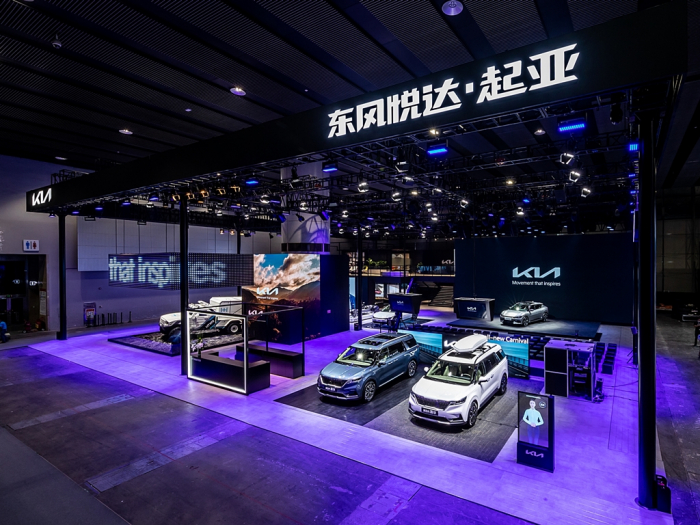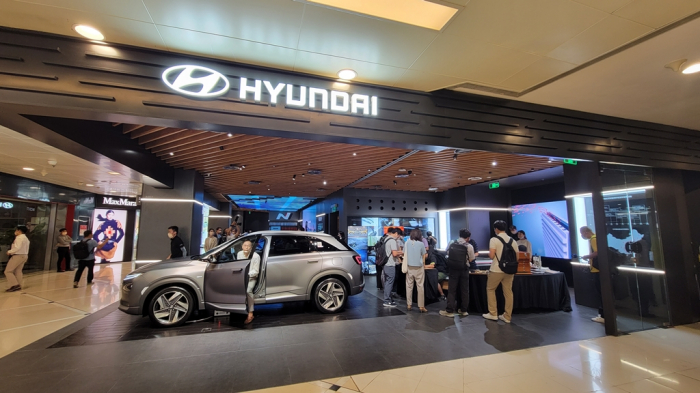Automobiles
Kia mulls investing $754 mn in China instead of Russia
The South Korean automaker may produce vehicles for exports from China as its sales in the mainland continue to fall
By Nov 16, 2022 (Gmt+09:00)
4
Min read
Most Read
LG Chem to sell water filter business to Glenwood PE for $692 million


Kyobo Life poised to buy Japan’s SBI Group-owned savings bank


KT&G eyes overseas M&A after rejecting activist fund's offer


StockX in merger talks with Naver’s online reseller Kream


Mirae Asset to be named Korea Post’s core real estate fund operator



Kia Corp., South Korea’s second-largest carmaker, is considering an investment of $754 million, which had been set aside for Russia, in China to transform its ailing unit in the world’s top automobile market into a production base for exports to Southeast Asia and other regions.
The leading South Korean automaker Hyundai Motor Group, to which Kia belongs, has been trying to revive its Chinese business. The group is also stuck between a rock and a hard place on whether to continue its presence in Russia even after heavy investments due to Moscow’s invasion of Ukraine.
Global carmakers rushed to abandon Russia on tumbling sales and deteriorating brand images in other markets due to the growing anti-Russian sentiment. Japanese Mazda Motor Corp. earlier this week exited from Russia by selling its shares in its eastern European joint venture for only one euro ($1), according to foreign media reports. German luxury carmaker Mercedes-Benz AG and US Ford Motor Co. joined the long list of automakers that withdrew from the market.
Kia, which had planned to spend 1 trillion won ($754 million) to expand its presence in Russia, mulled spending the money on altering production facilities in China to manufacture vehicles for other markets such as Southeast Asia and the Middle East, as its unit in the mainland has been suffering from tumbling local sales.
FULL-SCALE CAPITAL EROSION
Kia’s 50-50 JV with Jiangsu Yueda Group in China reported a full-scale capital erosion again in the third quarter as its liability totaled 2.3 trillion won, exceeding its total asset of 2.1 trillion won, according to the South Korean carmaker’s quarterly report filed to a local financial regulator.
The JV, which had been owned by Kia, Yueda and Dongfeng Motor Corp., logged another complete capital erosion in the first quarter. Kia and Dongfeng, which dropped out of the partnership by selling its 25% stake to Yueda, injected 720 billion won during the period, but it did not help much.
The JV has been in red since 2017 with a combined loss of more than 2.2 trillion won on sluggish sales. It lost a combined 389.8 billion won in the first three quarters, selling just 68,000 vehicles during the period. In 2016, it sold some 650,000 units.
Kia’s larger affiliate Hyundai Motor Co. has been facing a similar situation. Beijing Hyundai Motor Co., its 50-50 JV with China’s BAIC Motor Corp. has been reporting an annual operating loss of more than 1 trillion won since 2020.
Its sales shrank to some 343,000 units last year, less than a third of 1.14 million vehicles in 2016. It sold a total of only 180,000 units in the January-September 2022 period.

EXCESSIVE INVESTMENTS
Hyundai and Kia have also been suffering from their excessive investments and ineffective corporate governance structures, industry sources said.
The two carmakers sold 460,000 vehicles in China last year, less than a quarter of their total capacity of 2.1 million units a year.
Their operating rates in China were estimated at only around 20% based on the sales, although they have yet to unveil official run data. Many of their production lines including Beijing Hyundai’s Chongqing plant have been suspended.
That was the result of a lack of analysis on the mid-to-long-term risks in the market, industry sources said. Hyundai and Kia missed the trend in the Chinese automobile market of the growing demand for higher-end models while focusing on capacity expansion to meet their rapid growth in the short term.
The JV structures also dragged lower their business performances, industry sources in Seoul pointed out. BAIC and Yueda are state-owned, refraining Hyundai Motor Group from only seeking its own interests.
The Chinese authorities pressured Hyundai and Kia for such massive investments, according to sources in Seoul.
BETWEEN A ROCK AND A HARD PLACE
Hyundai and Kia are stuck between a rock and a hard place on whether to continue their operations in China as they will have to spend much more to maintain the business there unless their sales significantly rebound, sources said.
“China is too big to give up but it is also difficult to keep burning cash,” said a source at a South Korean automaker. “The group’s top executives including Chairman Chung Euisun will be deeply concerned.”
The group needs to take controlling stakes in the JVs to take active rescue measures, some experts said.
China lifted the 50% limit of foreign automakers’ stakes in JVs this year. In the past, foreign carmakers had to partner with China-based companies in JVs and hold no more than a 50% stake in them. BMW raised its stake in its Chinese JV with Brilliant Auto Group to 75% from 50%.
Write to Hyung-Kyu Kim, Han-Shin Park and Il-Gue Kim at khk@hankyung.com
Jongwoo Cheon edited this article.
More to Read
-
 AutomobilesHyundai Motor between rock and a hard place over Russia operations
AutomobilesHyundai Motor between rock and a hard place over Russia operationsAug 08, 2022 (Gmt+09:00)
2 Min read -
 Electric vehiclesBeijing Hyundai to launch two EVs only for China for revival
Electric vehiclesBeijing Hyundai to launch two EVs only for China for revivalJul 18, 2022 (Gmt+09:00)
2 Min read -
 Electric vehiclesHyundai, BAIC Motor to inject $942 mn in China JV for EVs
Electric vehiclesHyundai, BAIC Motor to inject $942 mn in China JV for EVsMar 20, 2022 (Gmt+09:00)
2 Min read -
 War in UkraineHyundai’s auto exports to Russia cut by half in February, hit by war
War in UkraineHyundai’s auto exports to Russia cut by half in February, hit by warMar 14, 2022 (Gmt+09:00)
3 Min read -
 War in UkraineKorea Inc. in dilemma over Russia biz amid Ukraine war
War in UkraineKorea Inc. in dilemma over Russia biz amid Ukraine warMar 08, 2022 (Gmt+09:00)
long read
Comment 0
LOG IN


